
29 Dec, 2015
9 reasons why the Thailand Halal Assembly is NOT just another ordinary trade event
Bangkok – Thailand lies at the heart of ASEAN. Like an umbilical lifeline, the isthmus of Thailand-Malaysia links the Buddhist-majority northern half of ASEAN to the Muslim-majority southern half. This makes Thailand, a Buddhist majority country with the largest Muslim minority in ASEAN, a geographical bridgehead between two regions as well as a symbolic bond between religions and cultures. If it remains stable and peaceful, so will all of ASEAN.
Thanks to that connectivity, the Thailand Halal Assembly (THA), the predominant annual trade show for the Thai Muslims, assumes even more value and importance. The call by former Thai Foreign Minister and ASEAN Secretary-General Dr Surin Pitsuwan for the Thai and global halal assemblies to start thinking about broader issues beyond just food, consumer products and services has given it greater impetus. The THA has every opportunity to fulfill this vision in more ways than one.
The following nine contributing factors stood out at the most recent THA, held in Bangkok between December 25-27:
1. ALLEVIATE POVERTY AND PROMOTE A MORE BALANCED DISTRIBUTION OF INCOME: The vast majority of booths were small and medium sized enterprises, operating largely in the provincial areas. Same with the vast majority of service-sector booths. Similar to the dozens of other Thailand-based trade shows, the THA provides a unique opportunity for the many small traders to network and boost their business expertise. As grassroots job-creators, SMEs are the bedrock of the Thai and ASEAN economies. This meets the over-arching goal of the latest 17-point UN Sustainable Development Goals, which is to alleviate poverty.
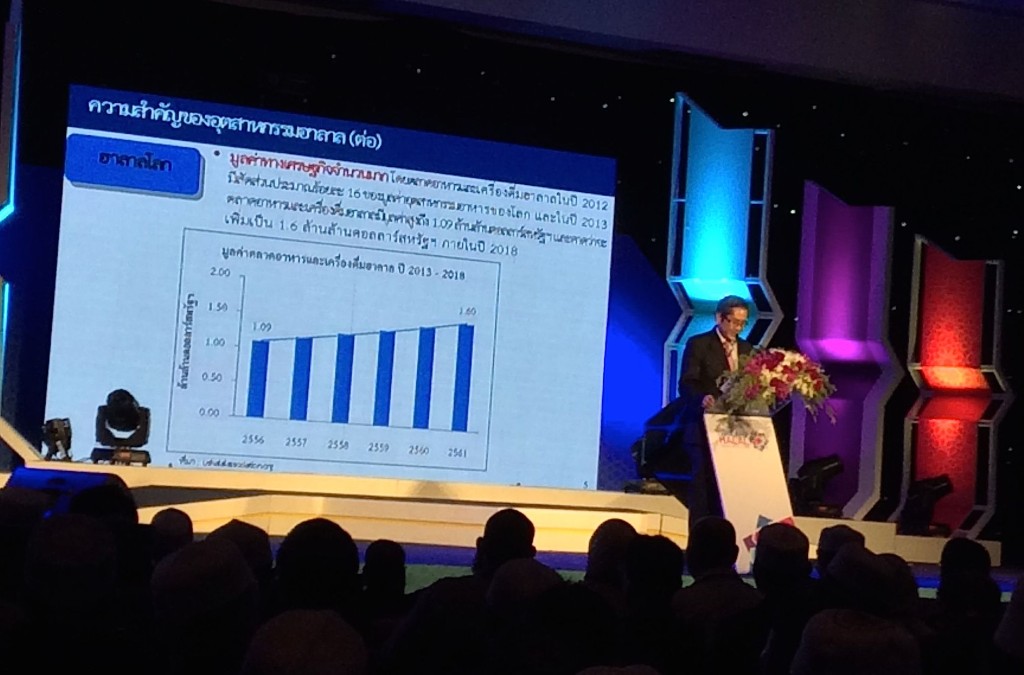
Dr. Porametee Vimolsiri, Secretary General of National Economic and Social Development Board, giving his talk
-
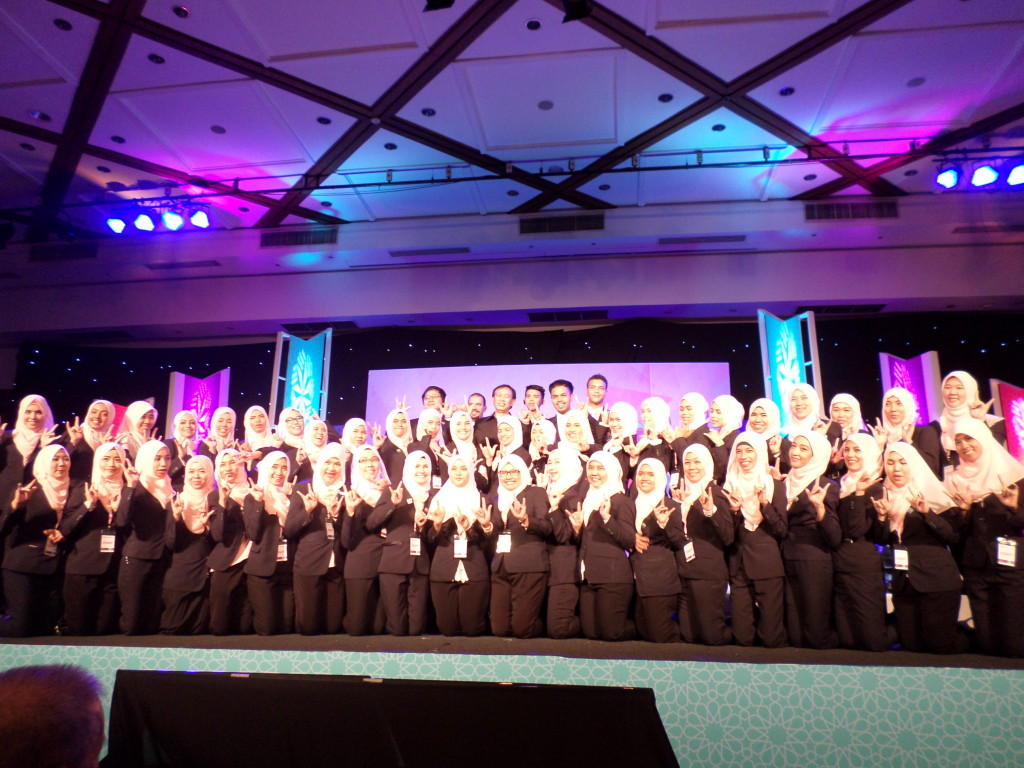
The entire event’s support crew comprised of young ladies.
2. GREAT JOBS FOR WOMEN: Advancing the livelihoods and income of women meets UN SDG # 5 which seeks gender equality. The vast majority of THA 2015 booths were staffed by women, mostly owners of the exhibiting companies. Many spoke very good English and had excellent entrepreneurial ideas. A special session at the THA was devoted just to the topic of Thai-Muslim women in an integrated ASEAN community. One of the most remarkable entrepreneurs I met was Fadilah Arwae, 25, who told me it was her life’s desire to run her own business. Her Amineen Shop sells elegantly designed notebooks, pens and other stationery and gift items. Another company was selling locally-made footwear under the brand-name Messenger. The parent had left his two daughters, Burong, 17, and Tanyong Wang-aree, 11, to take care of the booth while he took a break. Clearly adept salesgirls, they talked me into buying a pair of very comfortable home-slippers.
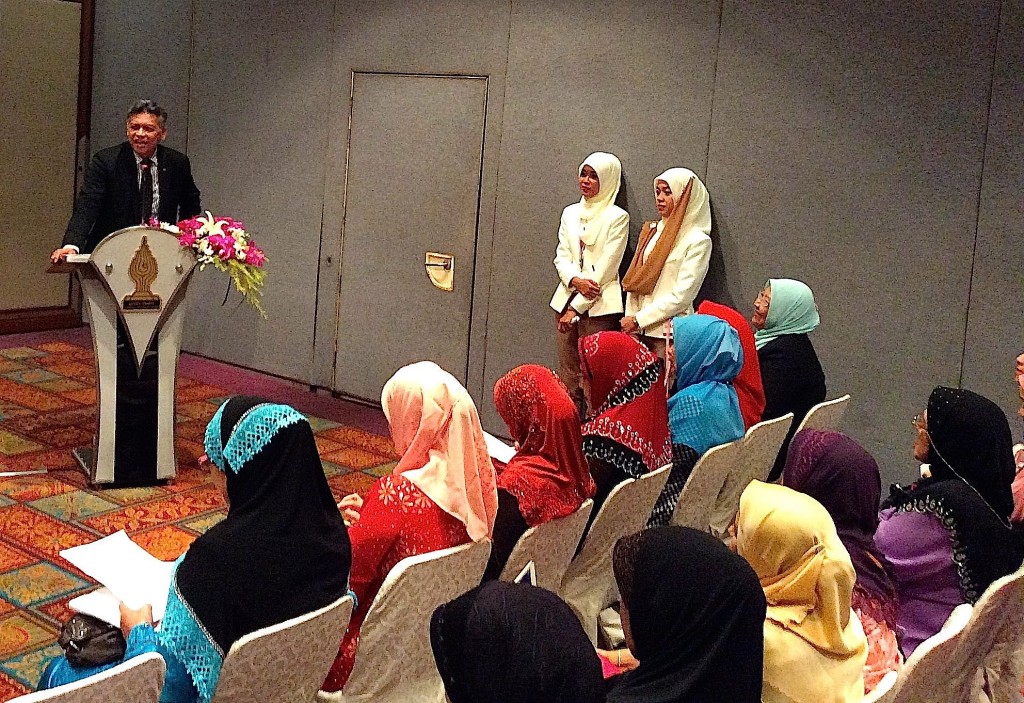
Dr Surin Pitsuwan spoke at a special session on the role of Thai-Muslim women in ASEAN.
-
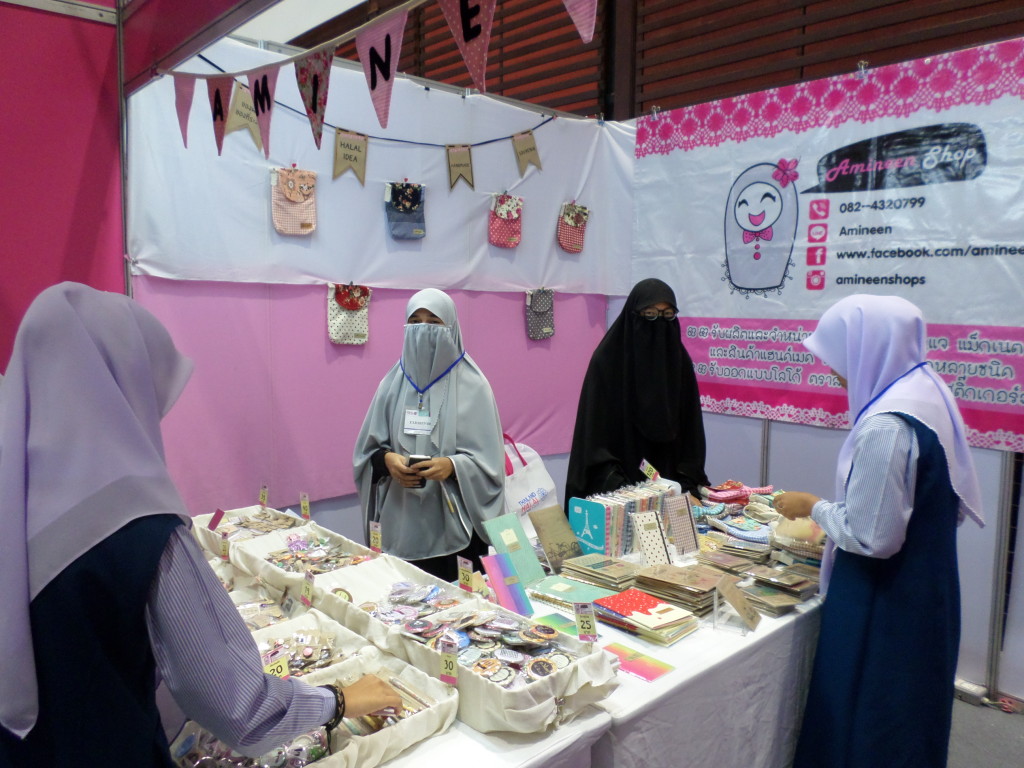
Fadilah Arwae, 25, (left) owner of the Amineen Shop
-
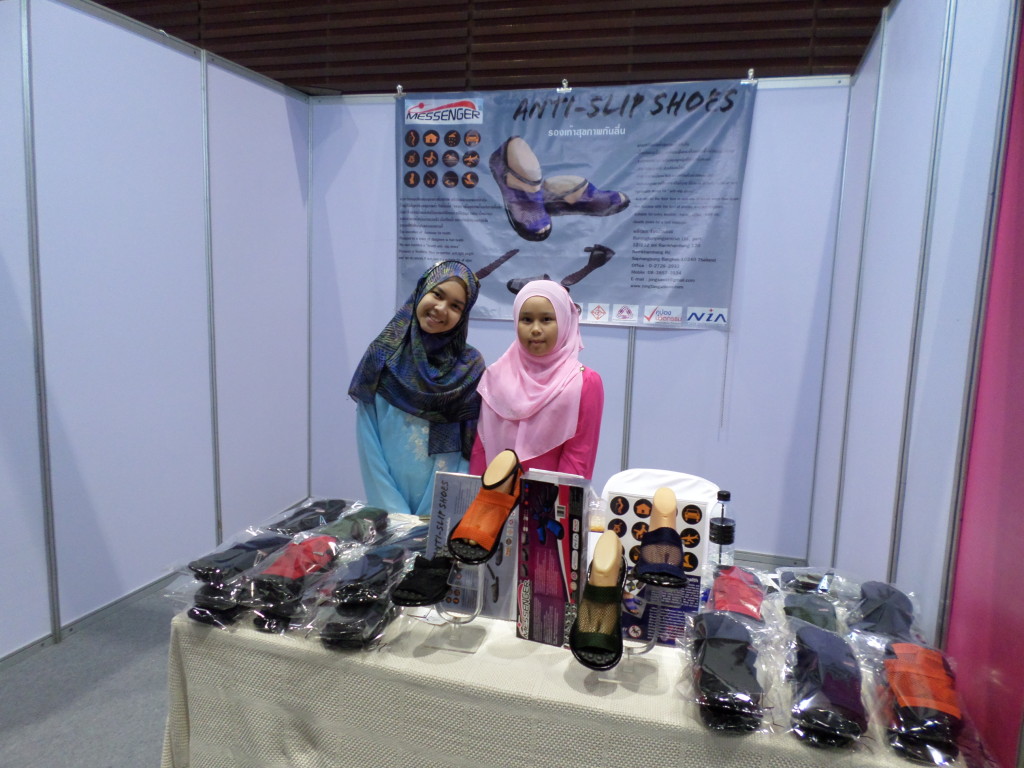
Burong, 17, and Tanyong Wang-aree, 11, at the booth of Messenger anti-slip footwear
-
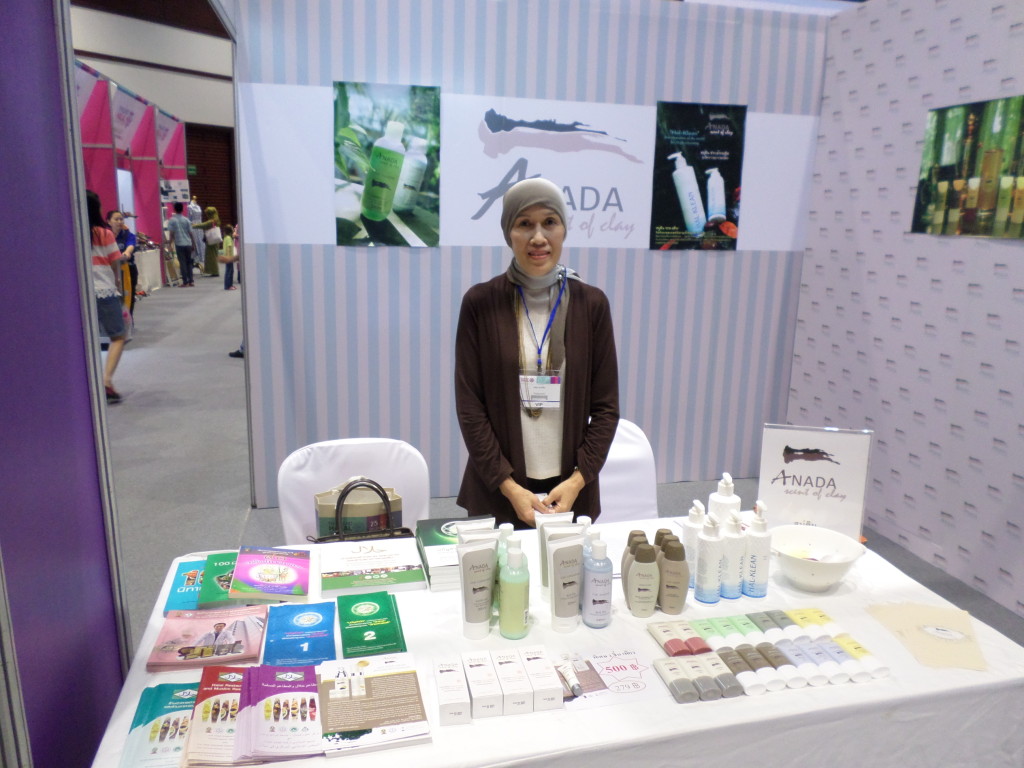
Mrs Kusoom Dahlan, Manager of Hal-Q, distributor of Anada herbal products. She worked for Malaysia Airlines in Bangkok for more than 30 years before retirement last year.
3. PROMOTE INTRA-ASEAN TRADE: After Thailand, the largest number of businesses were from Malaysia, selling coffee mix, teh tarek, balms, herbal products and more. As the show grows, a promising market of Indonesian entrepreneurs will sign up. No doubt, traders from the Muslim minorities in Laos, Cambodia and Vietnam will follow. That alone could double the size of the show. As trade grows, so will transport, tourism and travel within ASEAN.
-
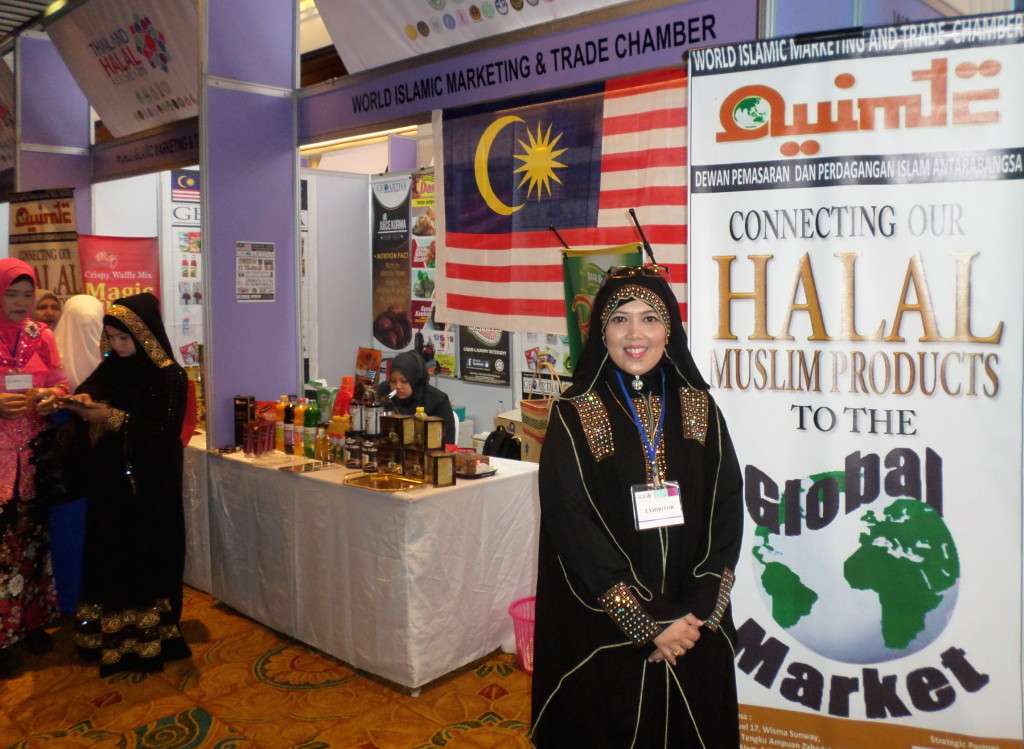
Zuraini Hasanuddin, President of the World Islamic Marketing and Trade Chamber.
-
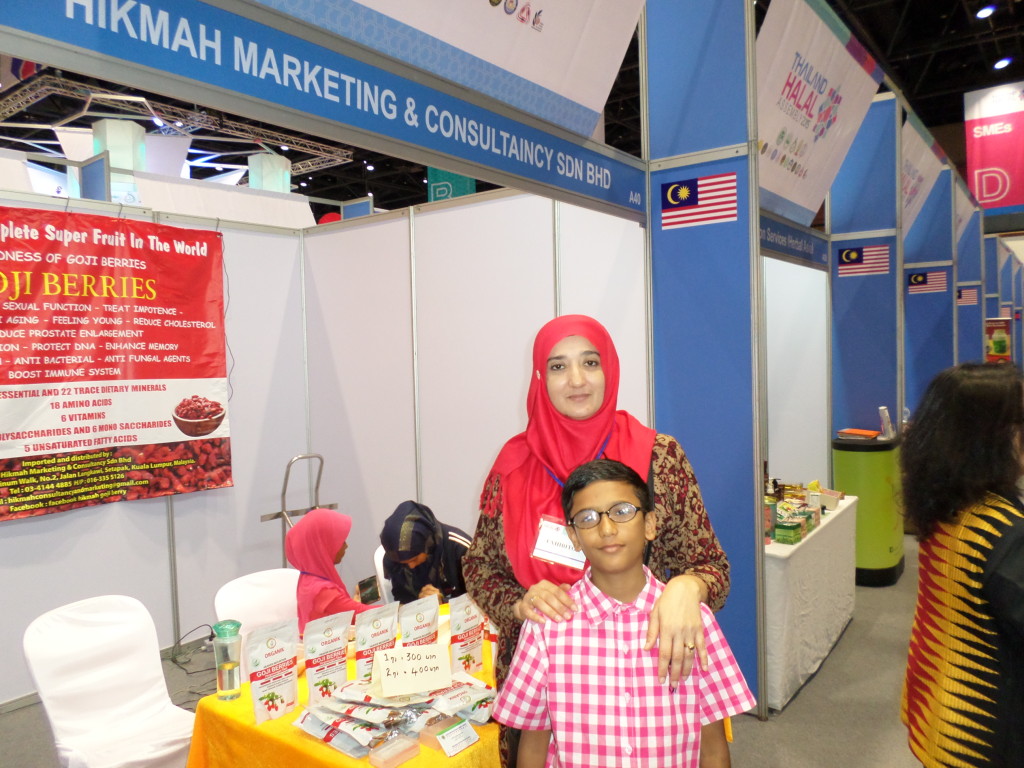
Salwa of Hikmah Marketing. She is also secretary of the Malaysia China Muslim Business Chamber of Commerce.
-
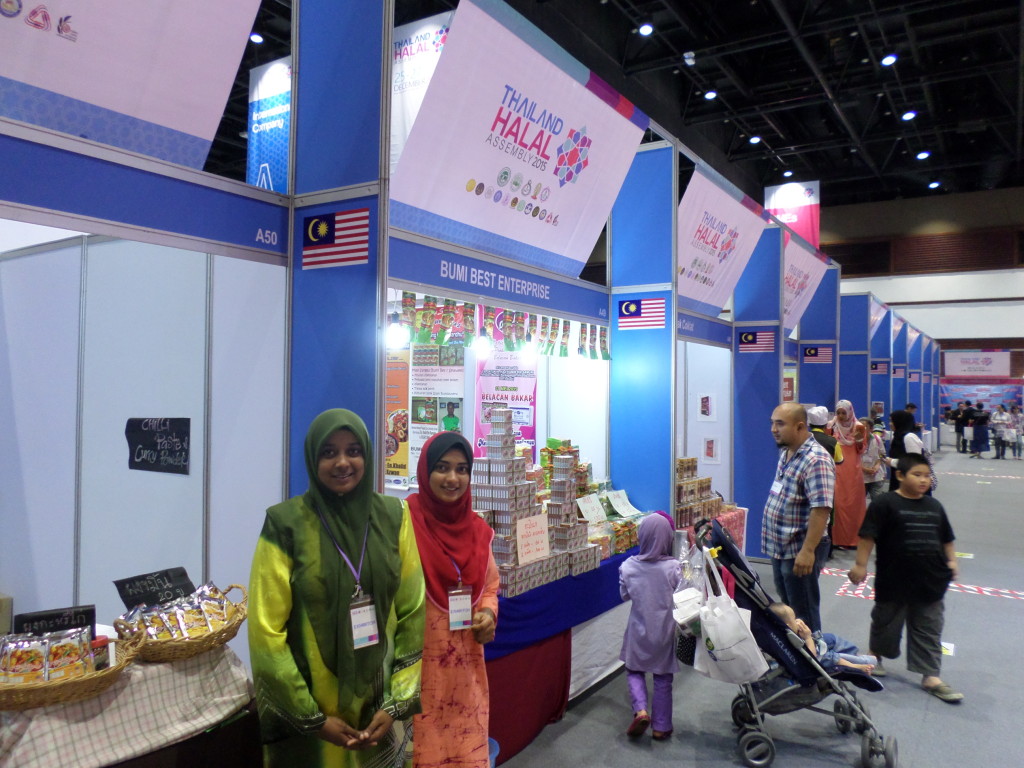
Nor Faridah Sariff, (left) owner of Shiffa Enterprises, based in Penang
4. STRONG TRAVEL & TOURISM PRESENCE: A large number of booths were from the travel & tourism sector. They ranged from the Krabi Halal Tourism Business Association to hotels, inbound and outbound tour companies and even a lone tailor-shop. Assoc. Prof. Dr. Pakorn Priyakorn, Director, the Halal Standard Institute of Thailand, Chulalongkorn University, told the closing ceremony that in 2016, tourism will gain a higher profile in line with the strategy to position Thailand as a Muslim-friendly destination.
-
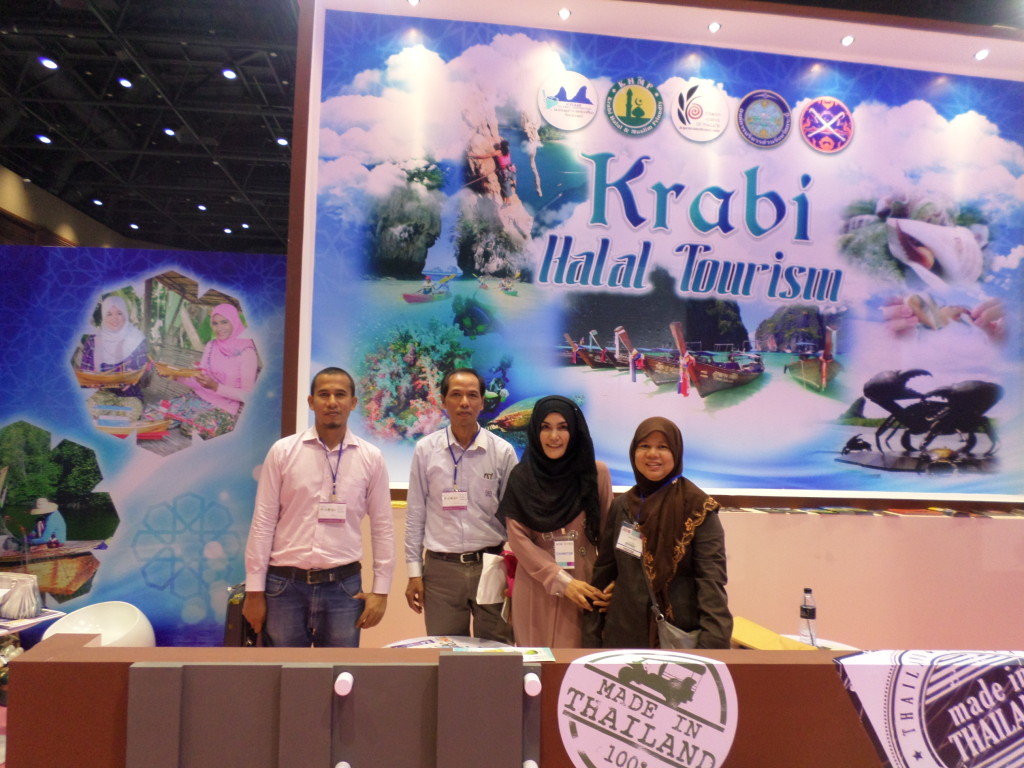
Krabi was the only Thai province that exhibited at the event in one joint booth with a specific tagline promoting halal tourism.
-
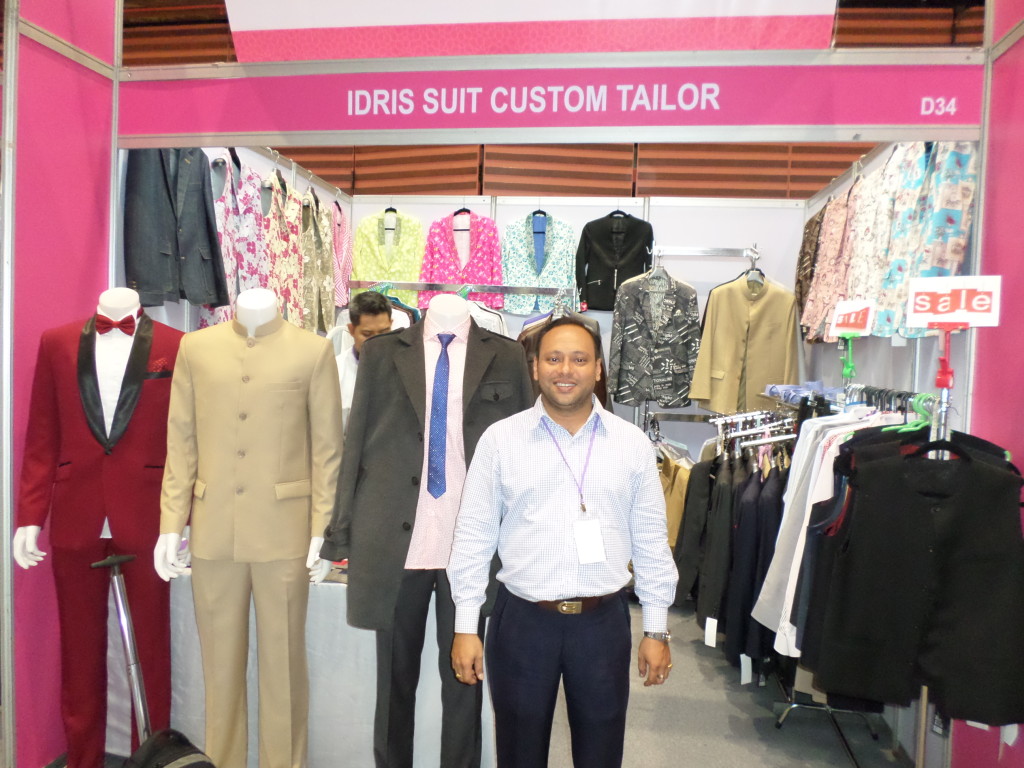
Mr Adisak Tanprasert (aka Idris), owner-operator of the only tailor shop to exhibit at the Thailand Halal Assembly.
5. INCLUSIVE SOCIETIES AND THE ROLE OF MINORITIES: Thailand has worked hard to ensure that its Muslim minority is provided equal rights and equal opportunities across the board. Admittedly, there are challenges, but to a large extent, this policy has succeeded. In turn, the Thai-Muslim community works hard to prove that it comprises of loyal citizens who see no contradiction between their nationality and their faith. The THA becomes a strong showcase of that commitment.
-
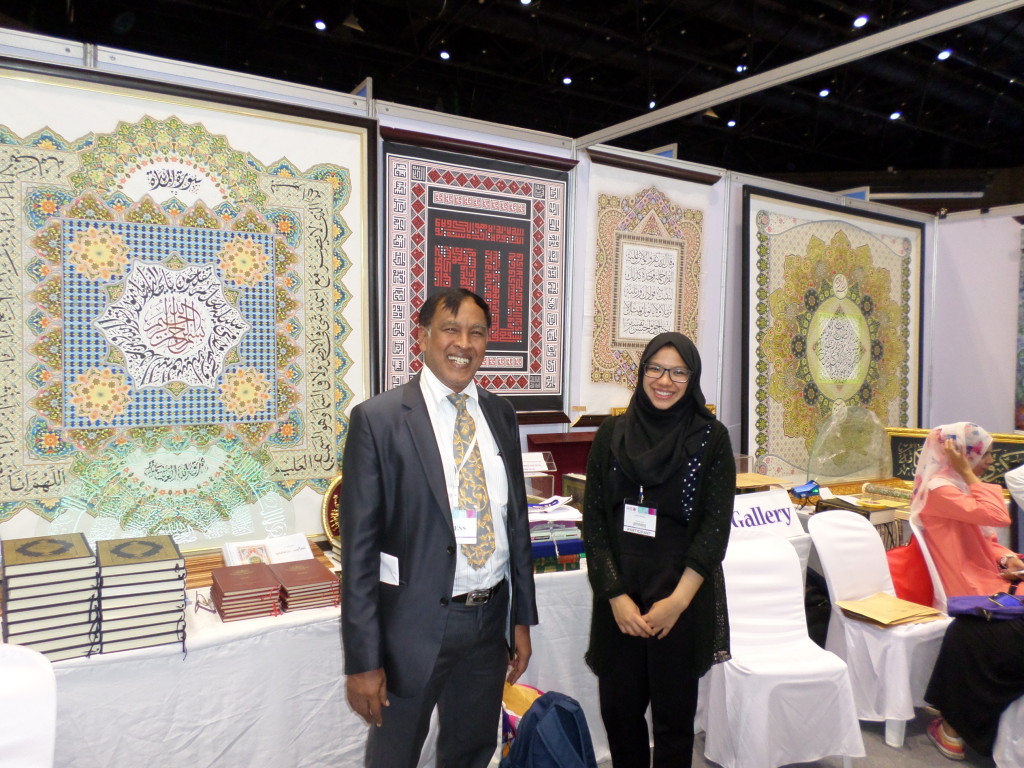
One of the organising committee members at the Islamic Centre of Thalland booth. The girl on the right is one of the daughters of another organising committee member who was helping out at the show.
6. BUILD EXTERNAL RELATIONS WITH THE ISLAMIC WORLD: Thailand has observer status in the Jeddah-based Organisation of Islamic Cooperation. The Thai government sees the Muslim minority as a significant asset to strengthen relations with the Islamic world, especially in the Middle East, Central Asian Republics and Africa. Many of the speakers at the THA 2015 forums came from Islamic countries as well as the OIC units.
-
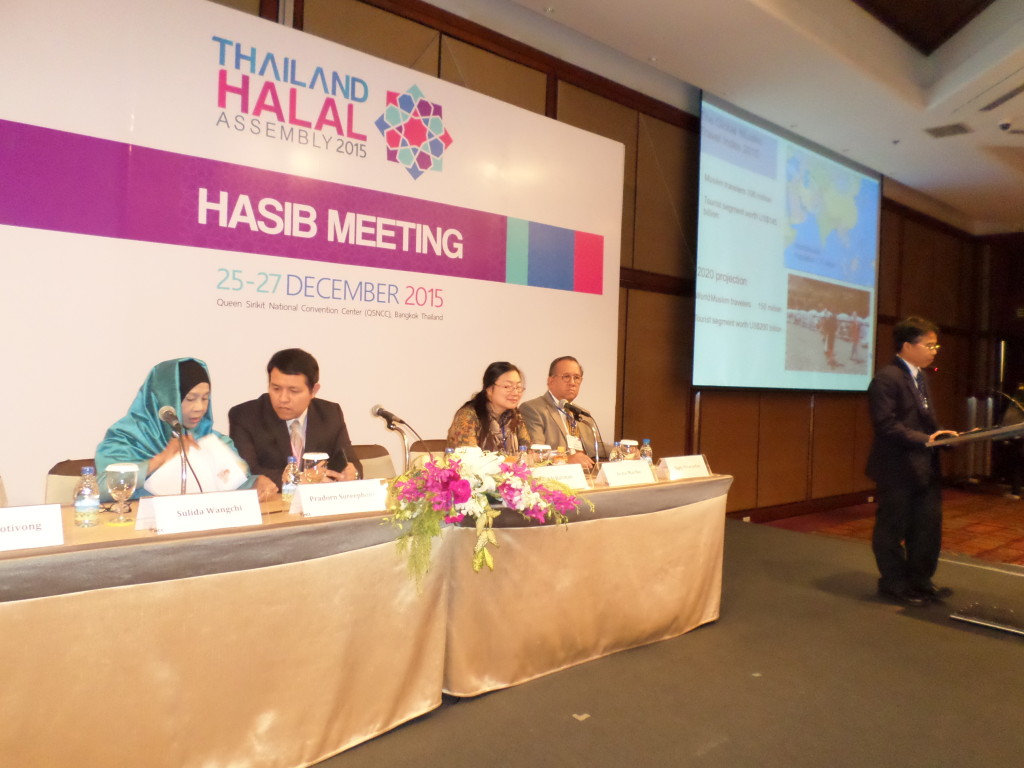
The Tourism panel in session
7. CONFRONT THOSE WORKING TO UNDERMINE ISLAM: A coordinated effort is under way in Thailand to undermine the image of Islam. Israel has made Bangkok a hub for spreading its influence in the Buddhist-majority countries of the Greater Mekong Subregion. Western and Australian expatriates, especially those holding dual Israeli nationality, are active sayanims, embedded in Thai media, universities and companies, writing anti-Muslim letters to the editors and spreading falsehoods via social media. Hindu extremist groups are also forging “shared values” links with their extremist Buddhist counterparts. They pose a serious threat to Thailand’s national security. The Thai-Muslim community has not yet forged a counter-strategy, but the Halal Assembly does provide a platform to initiate one.
8. ENHANCE BUDDHIST-MUSLIM UNDERSTANDING: The ASEAN Socio-Cultural Blueprint is the second pillar of ASEAN integration, due to take effect in 2016. So far, too much focus has been directed at economic integration. There is now a growing realisation that economic integration will work better if implemented in tandem with the other two – socio-cultural and political-security integration. Buddhism and Islam have much in common. The College of Religious Studies, Mahidol University, runs a dedicated International Center for Buddhist-Muslim Understanding to promote conferences and academic study of this critical issue. This meets SDG # 16 which calls for more peaceful and inclusive societies. Indirectly, the THA contributes to this, too.
-
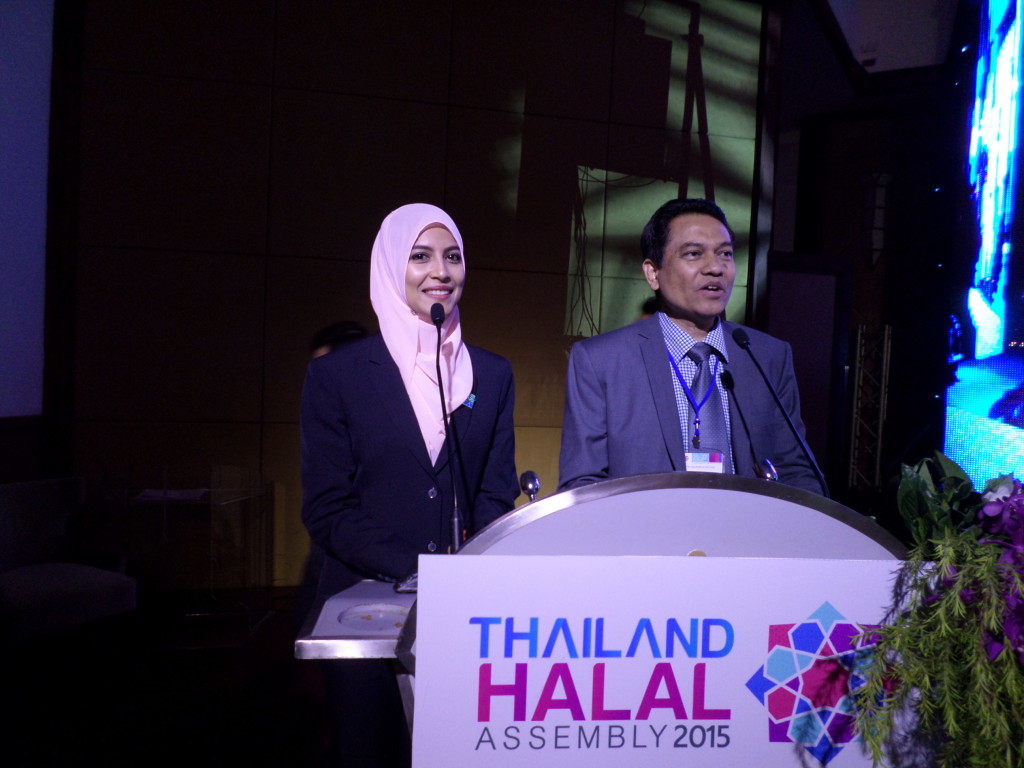
The Mistress and Master of Ceremonies at the Opening
9. STRONG THAI GOVERNMENT SUPPORT: For all the reasons above, the Royal Thai Government backs the THA. In addition to providing funding for the main event, several Thai ministries and government agencies all take booths and make presentations to outline their policies and plans. This will no doubt continue in the years ahead.
Conclusion
Now in its second year, the THA clearly has far more value and significance than just a trade show. It has limitless potential to grow. That will require better marketing and promotion, as well as more professional management and organisation. With additional public-private sector sponsorship and support, there is no reason why the THA cannot become both an ASEAN halal show as well as a showcase for Muslim-Buddhist understanding.
That will go a long way towards fulfilling Dr Surin’s vision, the process of ASEAN integration as well as the UN Sustainable Development Goals.



Liked this article? Share it!